Raksha Bandhan special: The eco-friendly bamboo rakhis crafted by Bastar’s tribal women
Tribal women in the naxal-affected Bastar district of Chhattisgarh are making eco-friendly rakhis and handicraft such as jewellery using bamboo. A joint effort by the district administration and a local non-profit is helping empower these adivasi women who otherwise used to work as farm labourers.

The mood is festive across India as it is the festival of Raksha Bandhan when sisters tie a rakhi thread on their brothers’ wrist, praying for their long and healthy life, and receive a token of love.
In tribal dominated Bastar district of Chhattisgarh, which is infamous for naxal encounters, the adivasi women are excited for another reason. They don’t celebrate the festival of Raksha Bandhan but their past one month’s hard labour is set to adorn several wrists and become a symbol of love between brothers and sisters.
“We were given training for making rakhi and jewellery. We enjoy working in groups and creating new designs. And it feels good to earn an additional income,” Chameli Nag, a resident of Rotama village, told Gaon Connection, while knotting stones to a rakhi thread.
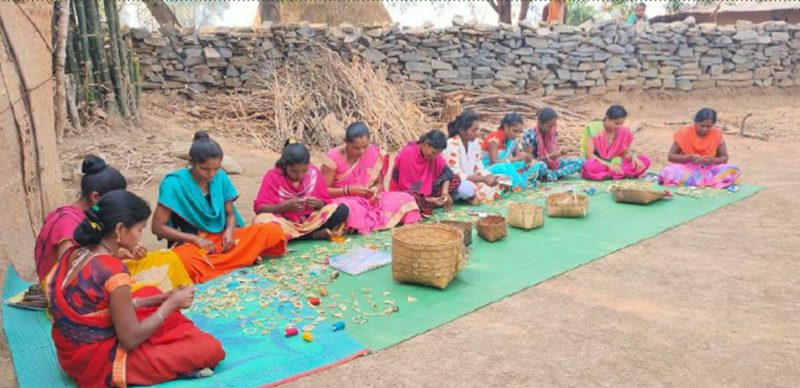
For the past one month, every morning, finishing all the household chores, tribal women in Bastar district would set out of their homes and spend the day making bright colourful rakhis. A local non-profit has been training these women to help them earn a livelihood.
“These women use locally sourced bamboo to make the rakhis, which are eco-friendly but have modern designs,” Mohit Arya, founder, Arya Prerna Samiti, a non-profit working for sustainable livelihood of tribal people in Chhattisgarh, told Gaon Connection.
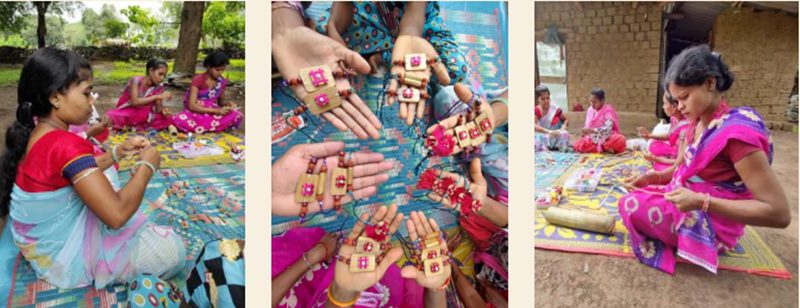
“In Bastar, a variety of bamboo is available in bulk. The craft of Bastar was dying. We wanted to revive this craft and earn respect and living for the artisans of Bastar,” said Arya. “And the craft of making rakhis out of bamboo has served that purpose,” he added.
According to him, this project of training tribal women to make rakhis is also an opportunity to break the stereotype of Bastar being only a naxal-affected district. “We want to show the country the beauty of Bastar,” said Arya, who has been working with tribal communities for the past 21 years.
Once farmer labourers, now entrepreneurs
A joint effort by the district administration and the non-profit has helped these tribal women earn a living. They were given training to make rakhis out of raw bamboo.
At least 30 tribal women in Rotama and Narayanpur villages of the district benefited from this initiative. Every woman managed to earn between Rs 6,000 and Rs 10,000 a month by making these eco-friendly rakhis. Each woman was given a target of making at least 20 rakhis a day.
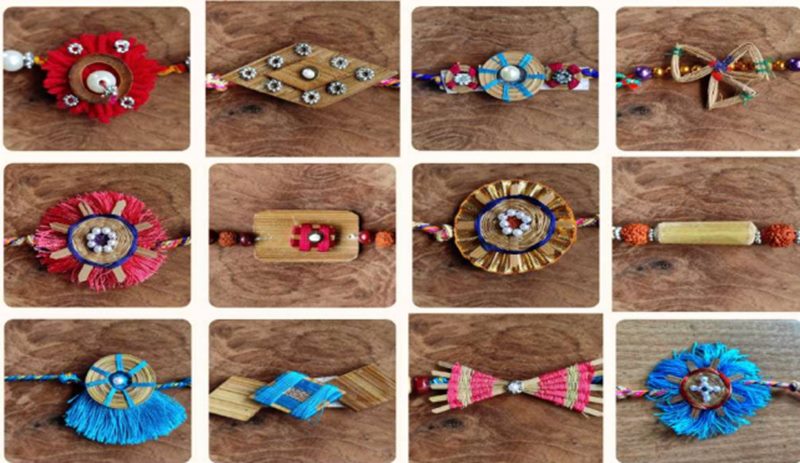
An additional honorarium is given to these women if they make more than the daily target. For instance, they get Rs 150 for making 20 rakhis a day, Rs 75 for an additional 10 rakhis (total 30) and Rs 300 for 40 rakhis.
“Ham log ko income mil raha hai to acha lag raha hai” (It feels so good to earn a living out of this), a tribal woman, who is part of the group that made rakhis, told Gaon Connection.
“Earlier, these women used to do farming and toil in the fields and do labour jobs. Now, they sit under shade, and do the work they like to enjoy,” Uma Negi, resident of Jagdalpur, who gives training to the tribal women, told Gaon Connection.
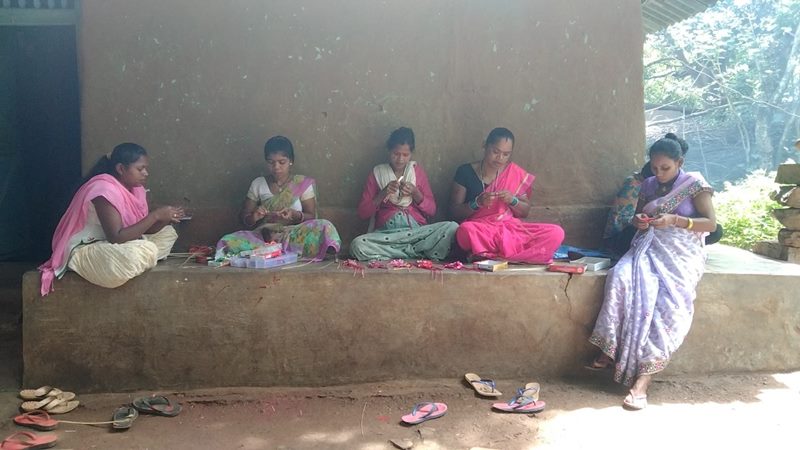
The 40-year-old informed that making rakhis is an arduous task. “It is not easy work. Women have to separate fine threads from raw bamboo. It requires patience and a lot of fine work to make designs. After wrapping threads around bamboo, these are given modern designs, painted, dried, and knot stones,” she added.
Apart from rakhis, these women are trained for jewellery making and come up with creative ideas of using locally available bamboo to make handicrafts.
These tribal women are giving new dimension to the products of Bastar and its handicraft. The initiative, as claimed, is helping empower regular artisans who were otherwise switching to other menial jobs.
Marketing and sales
Made by tribal women, these eco-friendly rakhis are being sold at stalls in the local market in Jagdalpur city of the district. It is supported by Tribal Tokni, a social platform for tribal products such as handicrafts, handlooms, and minor forest produce.
“We are working in collaboration with Tribal Tokni, which is working on marketing of these rakhis. We got some online orders too,” said Arya.
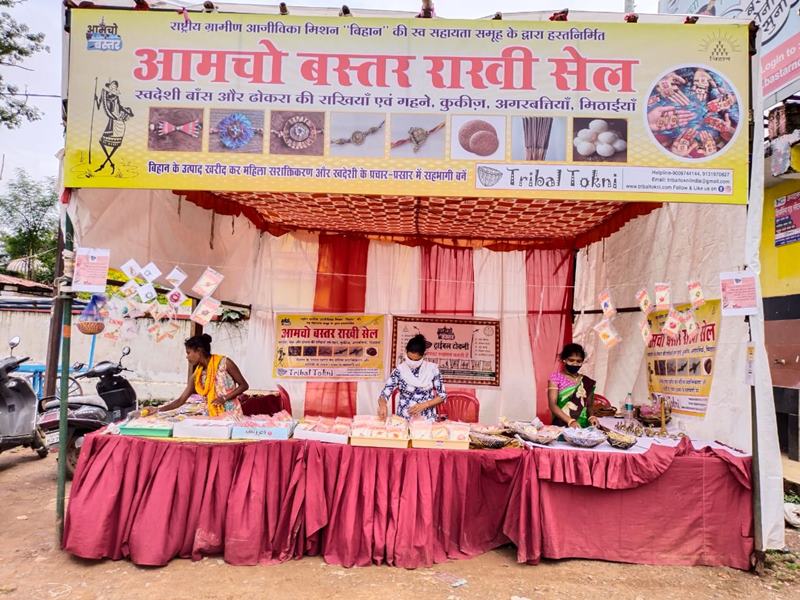
The non-profit recently registered with Amazon and Flipkart to expand the sales of handmade products made by the rural tribal women.
“We are stressing on increasing the production level. These tribal women are good at production level, but it is difficult for them to sell the products. We aim to provide a marketing ecosystem to tribal didis (sisters),” he added.
Arya informed that last year, a record sales of Rs 1.6 million was calculated by selling eco-friendly rakhis in Dhamtari district. This benefitted women associated with 60 self-help groups.
“Sales are good. People are asking us if our stall will be there even after rakhi. Customers are bored of buying rakhis made of stones and pearls, which cost over forty rupees per piece. We have given them a new variety and our bamboo rakhis are priced at twenty rupees only,” said Negi, who was on duty at the local market while she spoke with Gaon Connection, over the phone.
The efforts of these tribal women are not ‘tied’ to Raksha Bandhan alone. Next on their plan is bamboo lamps and jewellery.
Watch this space!
Happy Raksha Bandhan

